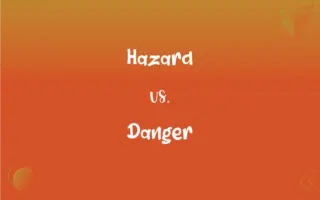Simile vs. Hyperbole: What's the Difference?
Edited by Aimie Carlson || By Harlon Moss || Published on February 24, 2024
A simile is a figure of speech comparing two different things using "like" or "as," while hyperbole is an exaggerated statement not meant to be taken literally.

Key Differences
A simile is a literary device used to compare two different things to illustrate a point or create a vivid image, using words "like" or "as." For example, saying "as brave as a lion" suggests courage by comparing someone to a lion. Hyperbole, on the other hand, involves exaggeration for emphasis or effect, such as "I'm so hungry I could eat a horse," which is not to be taken literally but emphasizes extreme hunger.
Similes are often used to make descriptions more expressive or easy to visualize, like saying "her smile was like sunshine," which paints a picture of warmth and happiness. Hyperbole is used to create a strong impression, add humor, or emphasize a point, as in "he's running faster than the wind," exaggerating someone's speed for dramatic effect.
In simile, the comparison is often realistic and plausible, grounded in a relatable context. For example, "quiet as a mouse" suggests a very low level of noise. Hyperbole, in contrast, deliberately strays from realism to achieve its effect, such as "I've told you a million times," where the number is exaggerated to stress frustration or frequency.
The use of simile can enhance the reader's understanding and connection to the subject by drawing parallels to familiar experiences or objects, as in "life is like a box of chocolates." Hyperbole often serves to convey emotions or reactions in a heightened manner, such as "I nearly died laughing," indicating something was extremely funny.
Both similes and hyperboles enrich language and expression, their usage and effects differ significantly. Similes provide clarity and relatability through comparison, while hyperboles offer emphasis and intensity through deliberate overstatement.
ADVERTISEMENT
Comparison Chart
Definition
A comparison using "like" or "as"
An exaggerated statement
Purpose
To create vivid imagery or analogy
To emphasize or create dramatic effect
Realism
Comparisons are plausible
Exaggerations are unrealistic
Usage in Language
Enhances descriptions realistically
Adds emphasis or humor
Effect on the Reader
Increases relatability and understanding
Evokes strong emotions or reactions
ADVERTISEMENT
Simile and Hyperbole Definitions
Simile
A comparison of two unlike things using "like" or "as."
Her cheeks are red like a rose.
Hyperbole
Used to emphasize or express strong feelings.
This bag weighs a ton.
Simile
A literary device for descriptive purposes.
The water was as smooth as glass.
Hyperbole
A rhetorical device for effect rather than accuracy.
I've been waiting for ages.
Simile
Enhances writing by drawing parallels.
The night was as black as coal.
Hyperbole
An exaggerated statement not meant to be taken literally.
I'm so hungry I could eat a cow.
Simile
Used to create vivid imagery or express similarity.
He fought like a lion in the battle.
Hyperbole
Common in everyday speech and literature.
She cried rivers of tears.
Simile
Often used in poetry and prose.
He is as cunning as a fox.
Hyperbole
Often humorous or ironic.
He's older than the hills.
Simile
A figure of speech in which two essentially unlike things are compared, often in a phrase introduced by like or as, as in "How like the winter hath my absence been" or "So are you to my thoughts as food to life" (Shakespeare).
Hyperbole
A figure of speech in which exaggeration is used for emphasis or effect, as in I could sleep for a year or This book weighs a ton.
Simile
A figure of speech in which one thing is explicitly compared to another, using e.g. like or as.
Figure of speech
Hyperbole
Deliberate or unintentional overstatement, particularly extreme overstatement.
Simile
A word or phrase by which anything is likened, in one or more of its aspects, to something else; a similitude; a poetical or imaginative comparison.
A good swift simile, but something currish.
Hyperbole
(countable) An instance or example of such overstatement.
Simile
A figure of speech that expresses a resemblance between things of different kinds (usually formed with `like' or `as')
Hyperbole
A hyperbola.
Hyperbole
A figure of speech in which the expression is an evident exaggeration of the meaning intended to be conveyed, or by which things are represented as much greater or less, better or worse, than they really are; a statement exaggerated fancifully, through excitement, or for effect.
Our common forms of compliment are almost all of them extravagant hyperboles.
Somebody has said of the boldest figure in rhetoric, the hyperbole, that it lies without deceiving.
Hyperbole
Extravagant exaggeration
FAQs
What is a simile?
A figure of speech comparing two different things using "like" or "as."
Can hyperbole be used in serious contexts?
Yes, but it's typically more effective in humorous or exaggerated scenarios.
Can a simile be negative?
Yes, similes can convey negative comparisons, such as "as sly as a fox."
What is hyperbole?
An exaggerated statement used for emphasis or humor, not meant literally.
How is a simile different from a metaphor?
A simile uses "like" or "as" for comparison, while a metaphor directly states the comparison.
Is hyperbole always obvious?
Usually, but it can sometimes be mistaken for literal truth if not clearly exaggerated.
How does a simile enhance writing?
By creating vivid imagery and making descriptions more relatable and expressive.
Are similes only used in poetry?
No, similes are used in various forms of writing, including prose and everyday language.
Is it easy to identify similes?
Generally, yes, because of the use of "like" or "as."
What makes a simile effective?
The clarity and creativity of the comparison make a simile effective.
Are similes always straightforward?
Mostly, though they can be complex depending on the context and creativity.
Can hyperbole be used in formal writing?
It can be, but it's more commonly found in creative or informal writing.
Can hyperbole be found in everyday language?
Yes, it's commonly used in daily speech for emphasis or humor.
How can hyperbole be misinterpreted?
If the exaggeration is too subtle, it might be taken as a factual statement.
What is the purpose of hyperbole?
To add emphasis, humor, or dramatic effect to a statement.
How does a simile differ from an analogy?
A simile is a simple comparison, while an analogy is a more extended comparison explaining a concept.
Can similes be culturally specific?
Yes, similes can draw on cultural references and may not translate well across cultures.
Do hyperboles have to be large exaggerations?
Not necessarily; even small exaggerations can be considered hyperbole.
What's the impact of hyperbole on the reader?
It can create a memorable, humorous, or dramatic impact.
Is hyperbole always positive or negative?
It can be either, depending on the context and intention of the speaker or writer.
About Author
Written by
Harlon MossHarlon is a seasoned quality moderator and accomplished content writer for Difference Wiki. An alumnus of the prestigious University of California, he earned his degree in Computer Science. Leveraging his academic background, Harlon brings a meticulous and informed perspective to his work, ensuring content accuracy and excellence.
Edited by
Aimie CarlsonAimie Carlson, holding a master's degree in English literature, is a fervent English language enthusiast. She lends her writing talents to Difference Wiki, a prominent website that specializes in comparisons, offering readers insightful analyses that both captivate and inform.






































































